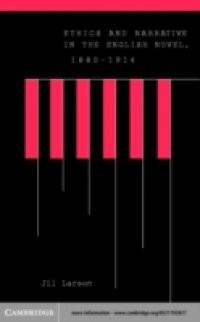Drawing on interdisciplinary work in the field of ethics and literature by a diverse range of thinkers, including Martha Nussbaum, Emmanuel Levinas and Paul Ricoeur, Jil Larson offers new readings of late Victorian and turn-of-the-century British fiction, she shows how ethical concepts can transform our understanding of narratives, just as narratives make possible a valuable, contextualised moral deliberation. Focusing on novels by Thomas Hardy, Sarah Grand, Olive Schreiner, Oscar Wilde, and Henry James, Larson explores the conjunction of ethics and fin-de-siecle history and culture through a consideration of what narratives from this period tell us about emotion, reason, and gender, aestheticism, and such speech acts as promising and lying. This book will be of interest to scholars of nineteenth century and modernism, and all interested in the conjunction between narrative, ethics and literary theory.

